一般现在时的基本用法及练习资料讲解
《一般现在时讲解》课件

表示客观事实或普遍真理
总结词
描述不受时间影响的客观事实或普遍真理。
详细描述
一般现在时可以用来描述不受时间影响的客观事实或普遍真理,例如“地球是圆的”、“水在100摄氏度下沸腾 ”等。这种时态强调的是事实的普遍性和客观性,不会因为时间而改变。
I eat an apple every day. (我每天吃 一个苹果。)
结构
一般现在时的基本结构是“主语+谓 语+(宾语)+(其他成分)”,其中 谓语动词以原形或第三人称单数形式 出现。
一般现在时的特点
01
02
03
强调现在
一般现在时强调当前时间 点,表示动作或状态正在 发生或存在。
普遍性
一般现在时用于描述普遍 存在的真理、事实或习惯 性行为,不受时间限制。
总结词
动词形式不同
详细描述
一般现在时的动词形式为原型,而一般将 来时的动词形式需要用will+动词原型。
与现在进行时的对比
总结词
动作状态不同
详细描述
一般现在时表示现在的动作或状态,强调动作的持续性 ;而现在进行时表示正在进行的动作或状态,强调动作 的进行过程。
总结词
用法侧重不同
详细描述
一般现在时更侧重于描述习惯性、经常性的动作或状态 ,而现在进行时则侧重于描述当前正在发生的动作或状 态。
一般现在时的用法
表示习惯性或经常发生的动作
总结词
描述日常生活中的常见行为或习惯。
详细描述
一般现在时用于描述日常生活中的常见行为或习惯,例如“我每天早上起床” 、“他每周去健身房锻炼”等。这种时态强调行为的频繁性或习惯性,而不是 特定的一次性事件。
一般现在时ppt课件完整版

不可数名词作主语时,谓语动词用单数 形式。
可数名词单数作主语时,谓语动词也用 单数形式。
例如:Water is essential for life.(水 对生命至关重要。)/ A book is on the table.(一本书在桌子上。)
例外情况总结
当主语为并列主语时,谓语动词的数要与靠近它的主语保持一致。
练习3答案
reads。解析:主语 She 是第三人称单数 ,且时间状语为 on weekends,表示经 常性动作,所以谓语动词要用单数形式 reads。
THANKS
时间状语分类及举例
表示经常性或习惯性的动作
always, usually, often, sometimes
表示现在的状态或特征
now, at present, these days
表示普遍真理或客观事实
in general, as a rule
频率副词分类及举例
01
高频副词
always, constantly, continually
注意区分完全否定和部分否定。完全 否定表示全部否定,而部分否定表示 部分否定。例如,“None of the students passed the exam.”(没 有一个学生通过了考试)是完全否定 ;“Not all of the students passed the exam.”(并非所有学生都通过 了考试)是部分否定。
does he work?等。
动词短语和情态动词的变化规则
03
动词短语中的动词和情态动词后接动词原形,如I can swim,
they often go out等。
02 肯定句结构与用法
主语+动词原形+其他成分
(完整版)小学英语时态讲解及练习(最新整理)
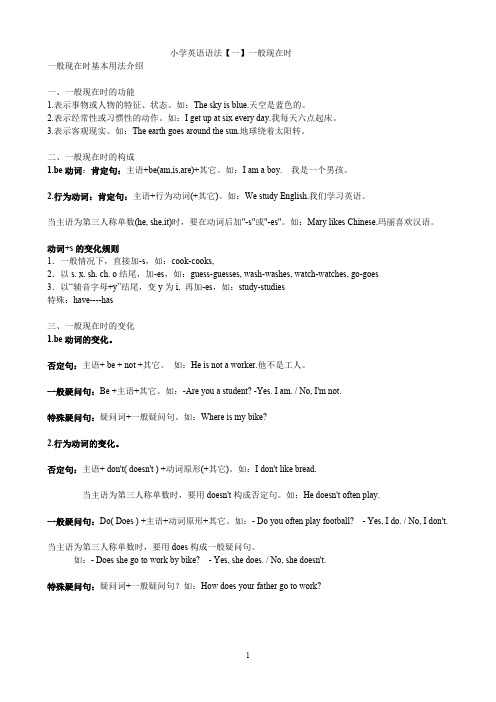
小学英语语法【一】一般现在时一般现在时基本用法介绍一、一般现在时的功能1.表示事物或人物的特征、状态。
如:The sky is blue.天空是蓝色的。
2.表示经常性或习惯性的动作。
如:I get up at six every day.我每天六点起床。
3.表示客观现实。
如:The earth goes around the sun.地球绕着太阳转。
二、一般现在时的构成1.be动词:肯定句:主语+be(am,is,are)+其它。
如:I am a boy. 我是一个男孩。
2.行为动词:肯定句:主语+行为动词(+其它)。
如:We study English.我们学习英语。
当主语为第三人称单数(he, she,it)时,要在动词后加"-s"或"-es"。
如:Mary likes Chinese.玛丽喜欢汉语。
动词+s的变化规则1.一般情况下,直接加-s,如:cook-cooks,2.以s. x. sh. ch. o结尾,加-es,如:guess-guesses, wash-washes, watch-watches, go-goes3.以“辅音字母+y”结尾,变y为i, 再加-es,如:study-studies特殊:have----has三、一般现在时的变化1.be动词的变化。
否定句:主语+ be + not +其它。
如:He is not a worker.他不是工人。
一般疑问句:Be +主语+其它。
如:-Are you a student? -Yes. I am. / No, I'm not.特殊疑问句:疑问词+一般疑问句。
如:Where is my bike?2.行为动词的变化。
否定句:主语+ don't( doesn't ) +动词原形(+其它)。
如:I don't like bread. 当主语为第三人称单数时,要用doesn't构成否定句。
一般现在时知识讲解与专项练习(讲义)-人教PEP版英语六年级上册

六年级上册一般现在时知识讲解与专项练习一、一般现在时知识点【No. 1】概念:1.表不事物或人物的特征、状态。
如:The sky is blue.天空是蓝色的。
2.表示经常性或习惯性的动作。
如:I get up at six every day.我每天六点起床。
3.表示客观现实。
如:The earth goes around the sun.地球绕着太阳转。
【No.2】时间标志性词:every ... (every day/week/Sunday...)on+星期几(on Mondays/Tuesdays..)频度副词(always, usually often sometimes, rarely, seldom, never)【No.3】结构:①动词原形I like apples.②动词单三形式He plays football.③be动词I am a boy.有be无动(动:实义动词)①肯定句:主语+be+其他He is an English teacher.②否定句:主语+be not+其他He is not an English teacher.③一般疑问句:Be +主语+其他+...?Is he an English teacher?有动无be(动:实义动词)①肯定句:主语(非三单)+动词原形+其他I play football.主语(三单)+动词三单形式+其他He plays football.②否定句:主语(非三单)+don’t+动词原形+其他I don't play football.主语(三单)+doesn’t动词原形+其他He doesn't play football.③一般疑问句:Do+主语(非三单)+动词原形+其他?Do you play football?Does+主语(三单)+动词原形+其他?①肯定形式:主语十情态动词can/may+动词原形+宾语。
小学生一般现在时讲解及练习题
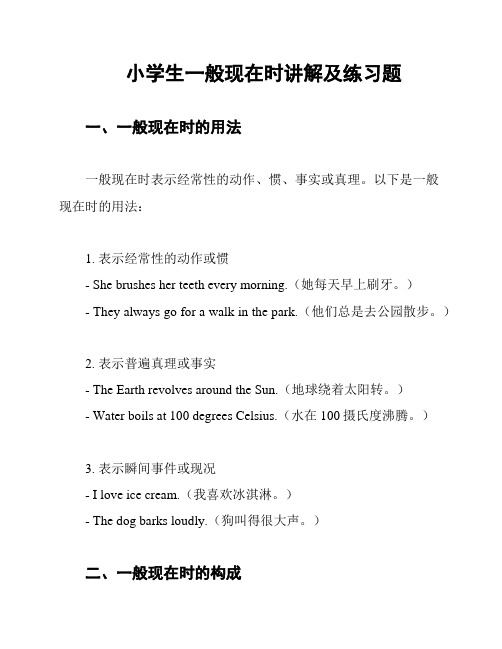
小学生一般现在时讲解及练习题一、一般现在时的用法一般现在时表示经常性的动作、惯、事实或真理。
以下是一般现在时的用法:1. 表示经常性的动作或惯- She brushes her teeth every morning.(她每天早上刷牙。
)- They always go for a walk in the park.(他们总是去公园散步。
)2. 表示普遍真理或事实- The Earth revolves around the Sun.(地球绕着太阳转。
)- Water boils at 100 degrees Celsius.(水在100摄氏度沸腾。
)3. 表示瞬间事件或现况- I love ice cream.(我喜欢冰淇淋。
)- The dog barks loudly.(狗叫得很大声。
)二、一般现在时的构成在一般现在时中,动词的变化相对简单。
1. 对于第三人称单数(He/She/It),动词要加-s或-es。
- He walks to school every day.(他每天走路去学校。
)- She eats an apple.(她吃一个苹果。
)- It runs fast.(它跑得很快。
)2. 对于其他人称(I/You/We/They),动词不变。
- I play soccer on weekends.(我周末踢足球。
)- You read books every night.(你每晚读书。
)- We go swimming in summer.(我们夏天去游泳。
)- They watch movies together.(他们一起看电影。
)三、练题请根据句意填入正确的动词形式。
1. My mother __________ (cook) dinner for us every evening.2. Tom and Lisa __________ (play) tennis on Saturdays.3. The sun __________ (rise) in the east.4. We __________ (study) English at school.5. Dogs __________ (bark) when they see strangers.1. cooks2. play3. rises4. study5. bark希望以上讲解和练习题对你有帮助!。
(完整版)一般现在时讲解+练习
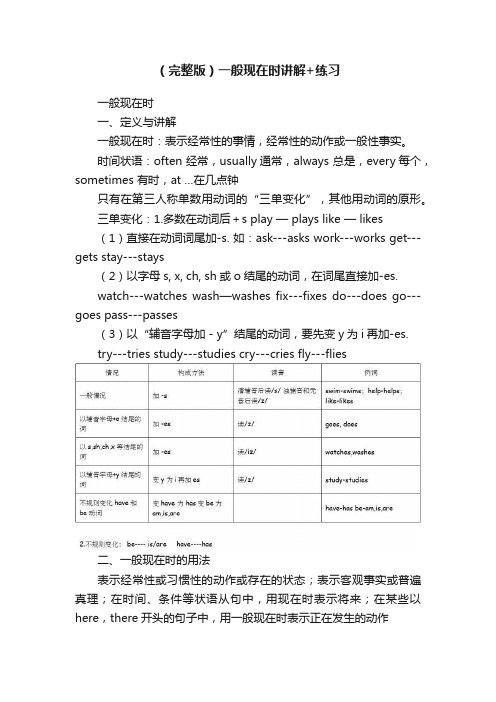
(完整版)一般现在时讲解+练习一般现在时一、定义与讲解一般现在时:表示经常性的事情,经常性的动作或一般性事实。
时间状语:often 经常,usually通常,always 总是,every每个,sometimes 有时,at …在几点钟只有在第三人称单数用动词的“三单变化”,其他用动词的原形。
三单变化:1.多数在动词后+s play — plays like — likes(1)直接在动词词尾加-s. 如:ask---asks work---works get---gets stay---stays(2)以字母s, x, ch, sh或o结尾的动词,在词尾直接加-es.watch---watches wash—washes fix---fixes do---does go---goes pass---passes(3)以“辅音字母加 - y”结尾的动词,要先变y为i再加-es.try---tries study---studies cry---cries fly---flies二、一般现在时的用法表示经常性或习惯性的动作或存在的状态;表示客观事实或普遍真理;在时间、条件等状语从句中,用现在时表示将来;在某些以here,there开头的句子中,用一般现在时表示正在发生的动作当主语是第三人称单数时:1、动词变相应的第三人称单数形式2、肯定句主语+动词s+其它3、否定句主语+doesn't+动词原形+其它4、一般疑问句Does+主语+动词原形+其它5、肯定回答 Yes,主语+does6、否定回答 No,主语+doesn't7、特殊疑问句特殊疑问词+一般疑问句当主语不是第三人称单数时:1、肯定句主语+动词原形+其它2、否定句主语+don't+动词原形+其它3、一般疑问句 Do+主语+动词原形+其它4、要注意,句式结构错则全都错。
5、谓语动词的形式:do/does一般现在时练习一、用所给词的正确形式填空1. We often ___________ (play) on the playground.2. He _________ (get) up at six o’clock.3. __________you _________ (brush) your teeth every morning.4. What____ (do) he usually _____ (do) after school?5. Danny _______ (study) English, Chinese, Math, Science and Art at school.6. Mike sometimes __________ (go) to the park with his sister.7. At eight at night, she ________ (watch) TV with his parents.8. ________ Mike________ (read) English every day?9. How many lessons ______your classmate____ (have) on Monday?10. What time ____his mother_________ (do) the housework?11. He often ______ (have) dinner at home. 12. Daniel and Tommy___ (be) in Class One. 13. We____ (not watch) TV on Monday. 14. Nick _____(not go) to the zoo on Sunday.15. They______ (like) the World Cup? 16. What ____they often ____ (do) on Saturdays17. Your parents________ (read) newspapers every day?18. The girl______ (teach) us English on Sundays.19. She and I _______ (take) a walk together every evening.20. There_______ (be) some water in the bottle. 21. Mike ______ (like) cooking.22. They_______ (have) the same hobby. 23. My aunt______ (look) after her baby carefully.24. You always____ (do) your homework well. 25. I_____ (be) ill. I’m sta ying in bed.26. She_____ (go) to school from Monday to Friday. 27. Liu Tao _____ (do) not like PE.28. The child often______ (watch) TV in the evening.29. Su Hai and Su Yang ______(have) eight lessons this term.30. -What day ______(be) it today? -It’s Saturday.31. Don’t make a noise. Grandpa __________ (sleep).32. Tom’s family__________ (watch) TV.33. It ________ (take) me two hours to finish my homework last night.34. What ______ your mother _______ (do) every evening? She_______ (wash) clothes.35. _______ it ______ (rain) every day?36. What _______ (do) you _______ on Sundays? We ________ (play) football.37. There ________ (be) a football match on TV every morning.38. They often ________ (visit) the Great Wall.39. Who _______ (dance) the best in your class?40. He _____________ (not come).41. The earth __________ (move) round the sun.42 She ________ (buy) a sweater.43. Mr. Wang often______ (go) to Shanghai.二、改句子1. Do you often play football after school? (肯定回答)_______________________________2. I have many books. (改为否定句)_______________________________3. Gao Shan's sister likes playing table tennis (改为否定句)________________________4. She lives in a small town near New York. (改为一般疑问句)________________________5. I watch TV every day. (改为一般疑问句)________________________6. David has a goal. (改为一般疑问句)________________________7. We have four lessons.(否定句)________________________8. Nancy doesn’t run fast (肯定句)________________________9. My dog runs fast. (一般疑问句) ________________________(把10—14小题变否定句,一般疑问句和划线提问)10. Mike has two letters for him. ________________________11. I usually play football on Friday afternoon.________________________12. Su Yang usually washes some clothes on Saturday. ________________________13. Mingming usually waters the flowers every day. ________________________14. Tom does his homework at home. ________________________三、写出下列动词的第三人称单数形式:1. wash_________ match _______ guess______ study______finish_________ go________ snow______ carry_________2. stop______ see________ drive ________let_______ carry______keep_____ join______ find_______ think________ teach______ catch______3. stay_______ begin______ forget_______ lie________ die _______run_______ prefer______ give________ ring_______ dance______ hope_______四、单项选择:1. There _____ an English film at the cinema now.A. will haveB. is going to haveC. is going to beD. is2. The picture _______ nice. A. looks B. is looked C. look D. is looking3. She ______ down and soon falls asleep. A. live B. lain C. laidD. sits4. They _____ the office in time very morning. A. reach to B. arrived C. went D. get to5. We shall go to Shanghai on business before you _____ back next week.A. will comeB. cameC. would comeD. come6. The plane ______ over there. A. is B. are C.am D. was7. I see her ____ the room this morning. A. to enter B. enteredC. enterD. enters8. The teacher ________us to come to school on time. A. ask B. asking C. asks D. asked9. John always ______ others. A. help B. helping C. helps D. to help10. He ______for eight hours every day. A. working B. to workC. worksD. worked11. You’d better ______ at home and ______ your homework.A. to stay, doB. stay, doC. to stay, to doD. stay, to do12. He sits down and ______ a rest. A. having B. have C. to haveD. has13. Uncle Wang never ______ a cake. A. make B. to make C. making D. makes五、请写出下列句子1.他每天早上七点乘公交车去上学。
一般现在时语法知识点总结

一般现在时语法知识点总结一、一般现在时的概念。
一般现在时表示经常的、习惯性的动作或存在的状态。
例如:I often get up at six o'clock.(我经常在六点钟起床。
)The earth goes around the sun.(地球绕着太阳转。
)二、一般现在时的构成。
1. be动词的一般现在时形式。
- 主语为第一人称单数(I)时,be动词用am。
例如:I am a student.- 主语为第三人称单数(he/she/it等)时,be动词用is。
例如:He is a doctor.- 主语为第二人称单数(you)、第一人称复数(we)、第二人称复数(you)、第三人称复数(they)时,be动词用are。
例如:You are my friends. They are workers.2. 实义动词(行为动词)的一般现在时形式。
- 当主语为第三人称单数(he/she/it,单个的人名、地名或单数可数名词等)时,实义动词一般在词尾加 -s或 -es。
- 一般情况下加 -s,如:play - plays,like - likes。
- 以s,x,ch,sh,o结尾的动词加 -es,如:go - goes,watch - watches。
- 以辅音字母 + y结尾的动词,把y变为i再加 -es,如:study - studies。
- 当主语为第一人称单数(I)、第二人称单数(you)、第一人称复数(we)、第二人称复数(you)、第三人称复数(they)时,实义动词用原形。
例如:I like reading. They play football every day.三、一般现在时的用法。
1. 表示经常或习惯性的动作。
- 常与表示频率的副词或短语连用,如:always(总是),usually(通常),often(经常),sometimes(有时),seldom(很少),never(从不),every day (每天),once a week(每周一次)等。
一般现在时讲解及练习题
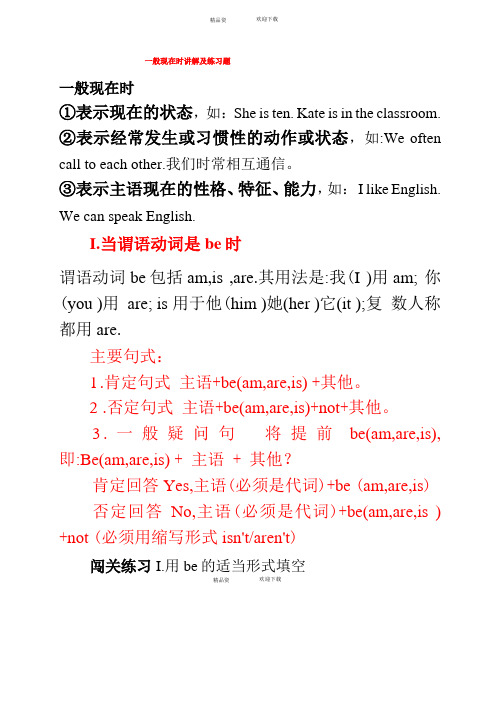
欢迎下载一般现在时讲解及练习题一般现在时①表示现在的状态,如:She is ten. Kate is in the classroom. ②表示经常发生或习惯性的动作或状态,如:We often call to each other.我们时常相互通信。
③表示主语现在的性格、特征、能力,如: I like English. We can speak English.I.当谓语动词是be 时谓语动词be 包括am,is ,are.其用法是:我(I )用am; 你(you )用 are; is 用于他(him )她(her )它(it );复 数人称都用are.主要句式:1 .肯定句式 主语+be(am,are,is) +其他。
2 .否定句式 主语+be(am,are,is)+not +其他。
3 .一般疑问句 将提前be(am,are,is), 即:Be(am,are,is) + 主语 + 其他?肯定回答Yes,主语(必须是代词)+be (am,are,is )否定回答No,主语(必须是代词)+be(am,are,is )+not (必须用缩写形式isn't/aren't )闯关练习I.用be 的适当形式填空欢迎下载 精品资 精品资1.---How you? ---I fine.2.I David,and my family name Green.3.---What color your clock? ---It white.4.---What this in English?---It an apple.5.Toy my brother.David mybrother,too.They my brothers.6.Look!These apple trees.7.We good students and you good teacher.8.My sister and my brother students.9.Five and three eight.10.your card number 5578?11.Where your pencils?12.These sweaters fifty dollars.13.How much his jacket?14.My brother,s birthday December 11th.15.When Kate,s birthday?II.将下面的句子变成一般疑问句并作出回答1.That is my football.2.Those are his books.3.Jim and Tom are good friends.4.My birthday is November 1st.欢迎下载精品资5.His son is twelve years old.111.将下面的句子变成否定句1.His card is on the table.2.There is some water in the bottle.3.Bob and Tony are our friends.4.There are thirty-five students in the classroom.5.The girl is his sister.II.当谓语动词是实义动词时1.当主语是第一人称(I \ we );第二人称(you)及复数时主要句式:(1)肯定句主语+实义动词+其他(2)否定句主语+don’t+实义动词+其他(3)一般疑问句Do+主语+实义动词+其他肯定回答:Yes,主语(必须是人称代词)+do. 否定回答:No,主语(必须是人称代词)+don’t.2.当主语是第三人称单数he, she, it及单数的名词时,主要句式:(1)肯定句:主语+实义动词的第三人称单数形式+其他一(2)否定句:主语+doesn’t+实义动词的原形+ 其他一欢迎下载精品资(3)一般疑问句Does +主语+实义动词的原形+其他肯定回答:Yes,主语(必须是人称代词)+does否定回答:No,主语(必须是人称代词)+doesn’t 动词第三人称单数形式变化规则:特殊变化have----has一、一般情况加s,例如:looks, likes, wants, plays,二、以ch, sh, s, x或o结尾的词,加-es,例如:teaches, washes, guesses, goes, does三、辅音字母+y结尾,变y为i力口-es,例如:carr yf carries, stud y f studies闯关练习I/将下面的句子变成一般疑问句并作出回答1.1h ave a baseball.2.Meria likes apples very much.3.He plays Ping-pang every day.4.We watch TV in the evening.5.Mr Wang often buys lots of things.6. Jane and Mary go to school at 7:30.II.将下面的句子变成否定句1.1n eed a bag for sport.2.He wants to go to a movie.3.She often goes to see Beijing Opera.欢迎下载精品资4.The girl has an egg for breakfast.5.We play basketball every day.6.My teacher knows my name.7.It sounds very interesting.IV.用所给词的适当形式填至1. her sister(have) a tennis racket?2.your friend(like) basketball?3.We(play) football every day.4.It(sound) very well.5.Jim(want) an orange.7.My mother(watch)TV in the evening.8. you(like) English?9. Mike and Li Lei(not like) eggs.10.What color your sister(like)?11. She(know) a little English.改写句子1.Do you often play football after school?(肯定回答)2.I have many books.(改为否定句)3.Gao Shan's sister likes playing tab改为否定句)欢迎下载4. She lives in a small town near New York. 疑问句)5. I watch TV every day.(改为一般疑问句)6. David has a goal.(改为一般疑问句)7. We have four lessons.(否定句)8. Nancy doesn't run f 肯定句)9. My dog runs fast.否定句:10. Mike has two letters for him.一般疑问句:I usually play football on Friday afternoon.一般疑问句: 精品资 (改为一般。
一般现在时态讲解及练习(精简版,错题版)

一般现在时态一、一般现在时的用法1) 表示经常性、习惯性的动作或存在的状态。
通常与副词sometimes, often, usually, always, everyday (year, month ), once (twice, three times) a day, 等等频率副词(时间状语)连用。
e.g. They usually go to school by bike.I take the medicine three times a day. 实义动词表示“动作”She helps her mother once a week.Mary’s father is a policeman.There are 50 students in my class. Be动词表示“状态”He is very busy now.be 、do不能放一起,如果非要放一起,do后要加ing, 变成现在进行时。
2) 表示主语的特征、性格、爱好等。
e.g. I work hard.I like watching TV.3) 表示客观真理e.g. There are seven days in a week.The moon moves round the earth.The sun rises in the east and sets in the west every day.Tomorrow is Tuesday.二、一般现在时的句子转换:三、一般现在时的结构:“主语+谓语+其它”,有时为了起强调作用,时间状语也可提前.三单变化:1)多数在动词后+s :play — plays like — likes ask---asks work---works get---gets stay---stays 2)以字母s, x, ch, sh或o结尾的动词,+-es:watch---watches wish---wishes fix---fixes do---does go---goes pass---passes 3)以“辅音字母加- y”结尾的动词,要先变y为i+-es.try---tries study---studies cry---cries fly---flies不规则变化:be---- is are have----has做题时常见错误如下:1)、be动词与行为动词同时出现在句子中例:We are plant (plant) the trees in spring.答案:plant2)、单三人称形式易出错例:1 He plaies (play) football very well.2 Danny gos (go) to school at 7:10.答案:1 plays 2 goes解析:1以辅音字母加y结尾的动词变单三人称形式才能把y换成i再加es;2与名词变复数不同,变单三人称形式以o结尾的词要加es.3)、在句式变换时易出错例:1 Does Jenny has (has) a good friend?2 Brian doesn’t lives (not live) in China.答案:1 Does have 2 doesn’t live解析:口诀:“见助动,用原形”。
(完整)初一英语一般现在时讲解及练习
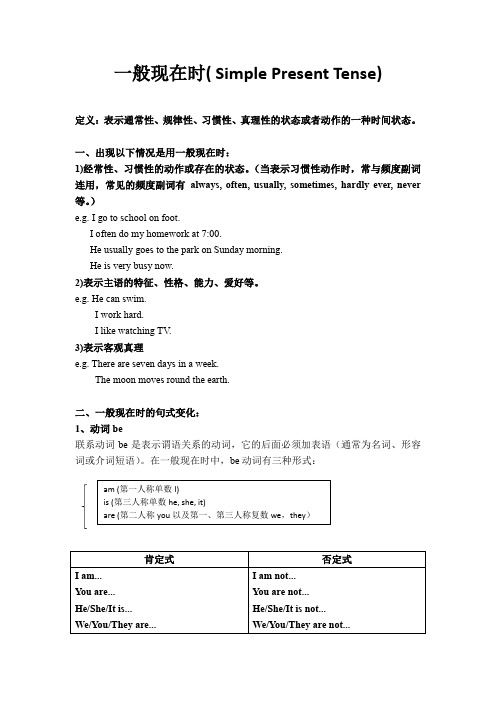
一般现在时( Simple Present Tense)定义:表示通常性、规律性、习惯性、真理性的状态或者动作的一种时间状态。
一、出现以下情况是用一般现在时:1)经常性、习惯性的动作或存在的状态。
(当表示习惯性动作时,常与频度副词连用,常见的频度副词有 always, often, usually, sometimes, hardly ever, never 等。
)e.g. I go to school on foot. I often do my homework at 7:00.He usually goes to the park on Sunday morning. He is very busy now.2)表示主语的特征、性格、能力、爱好等。
e.g. He can swim.I work hard. I like watching TV . 3)表示客观真理e.g. There are seven days in a week.The moon moves round the earth.二、一般现在时的句式变化: 1、动词be联系动词be 是表示谓语关系的动词,它的后面必须加表语(通常为名词、形容词或介词短语)。
在一般现在时中,be 动词有三种形式:一、用be的适当形式填空1.---How____ you? ---I____ fine.2.I___ David,and my family name___ Green.3.---What color ___ your clock? ---It___ white.4.---What___ this in English?---It___ an apple.5.Toy___my brother.David____my brother,too.They ___ my brothers.6.Look!These____apple trees.7.We____ good students and you____ good teacher.8.My sister and my brother_____ students.9. _____there many eggs in the kitchen?10.____your card number 5578?11.Where_____ your pencils?12.These sweaters ______ fifty dollars.13.How much ____ his jacket?14.My brother’s birthday____ December 11th.15.When _____ Kate’s birthday?16、There_____a boy and two girls beside the gate.17、Five and three ____ eight.二、.将下面的句子变成一般疑问句。
一般现在时讲解与练习

一般现在时Present Tense一、概念:表示通常性、规律性、习惯性的状态或者动作(有时间规律发生的事件)的一种时间状态。
拆开来讲就是:时间:指动作发生在“现在”的时间段内。
那么,多长的时间才叫“现在”呢?一天?状态:一般现在时最容易迷惑的一个问题,就是拿不准什么叫“经常发生的动作或存在的状态”?这个问题要分三层来讲:1.“经常发生的动作”,比如每天起床、吃饭、上学,一个星期去几次超市或新华书店等。
这些事件中,有的是有规律的,有的是偶尔做几次。
这些都算经常发生的事件。
我们要告诉人们的,是这个动作经常发生,是一般的情况而不是具体的某一次。
2.事物存在的状态。
3.有些动作或状态是永恒的,比如长江向东流、地球绕着太阳转,比如谚语中举的事例、文学作品中描绘的事例,像“好马不吃回头草”等等二、基本用法:1.表示经常性或习惯性发生的动作。
如:I always get up at 7 o’clock in the morning.我总是在早上7点起床。
We often read books at school.我们在学校经常看书。
They usually have dinner at 6:00 in the evening.他们通常在晚上6点吃晚餐。
2.表示现在的状态或特征。
如:She loves English very much.她非常爱英语。
We are always at home on weekends.周末我们总留在家。
Tom is an exellent player.汤姆是一位优秀的运动员。
3.表示客观的现实。
如:The sun rises in the east.太阳从东方升起。
Summer comes after spring.夏天在春天的后面4.用在按计划、规定或安排发生的事情。
如:The plane leaves at 9:30.飞机9点30分起飞。
Tomorrow is Sunday.明天是星期天。
英语一般现在时全面讲解(附练习及答案)
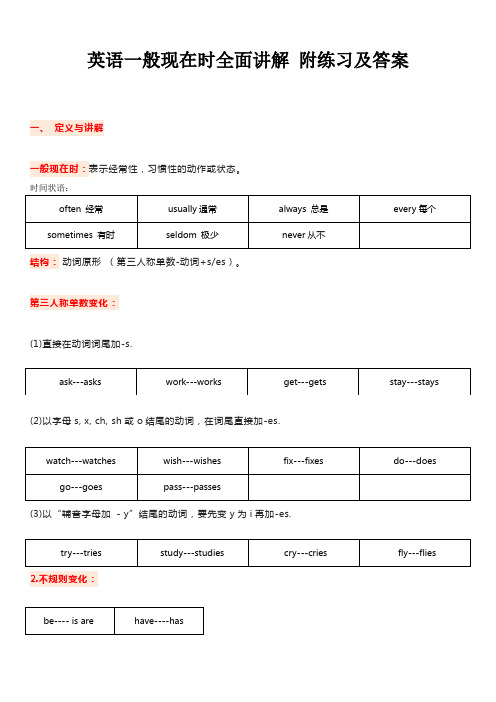
英语一般现在时全面讲解附练习及答案一、定义与讲解一般现在时:表示经常性,习惯性的动作或状态。
结构:动词原形(第三人称单数-动词+s/es)。
第三人称单数变化:(1)直接在动词词尾加-s.(2)以字母s, x, ch, sh或o结尾的动词,在词尾直接加-es.(3)以“辅音字母加- y”结尾的动词,要先变y为i再加-es.2.不规则变化:二、一般现在时用法1. 表示经常性,习惯性,永久性的动作或存在的状态.通常与副词sometimes, often, usually, always, every day (year, month ), once (twice, three times) a day,等时间状语连用。
2. 表示客观真理,科学原理,自然现象,等客观事实或格言,谚语等。
三、一般现在时的句子转换:(1)当句子中有be动词或情态动词时,则把be动词或情态动词(can,could等等)提到主语的前面变成疑问句;在be动词或情态动词后面加not变成否定句.(2)当句子中即没有be动词,也没有情态动词时,则在主语前加助动词do (you,以及复数), does(单数she,he,it)变成问句;在主语后谓语动词前加助动词don’t(I,you,以及复数), doesn’t(单数she,he,it)变成否定句,助动词后的动词要变成动词原形。
名师解析1.________ you often ________ tea?A.Do;drinks B.Does;drink C.Do;drink分析:你经常喝茶吗?根据often可知句子为一般现在时,主语为you,用助动词Do提问,动词用原形,C 符合题意,故选C。
2.My legs .A.hurt B.hurts C.hurting分析:我的腿……。
A痛,动词原形;B痛,动词单三形式,主语是名词复数,谓语动词用原形,排除;C痛,现在分词,用于现在进行时,构成be doing,缺少be,排除。
一般现在时讲解及练习
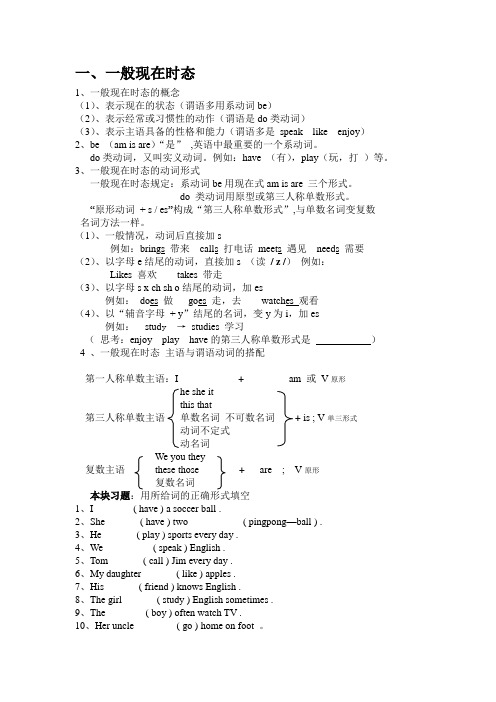
一、一般现在时态1、一般现在时态的概念(1)、表示现在的状态(谓语多用系动词be)(2)、表示经常或习惯性的动作(谓语是do类动词)(3)、表示主语具备的性格和能力(谓语多是speak like enjoy)2、be (am is are)“是”,英语中最重要的一个系动词。
do类动词,又叫实义动词。
例如:have (有),play(玩,打)等。
3、一般现在时态的动词形式一般现在时态规定:系动词be用现在式am is are 三个形式。
do 类动词用原型或第三人称单数形式。
“原形动词+ s / es”构成“第三人称单数形式”,与单数名词变复数名词方法一样。
(1)、一般情况,动词后直接加s例如:brings 带来calls 打电话meets 遇见needs 需要(2)、以字母e结尾的动词,直接加s (读/ z /)例如:Likes 喜欢takes 带走(3)、以字母s x ch sh o结尾的动词,加es例如:does 做goes 走,去watches 观看(4)、以“辅音字母+ y”结尾的名词,变y为i,加es例如:stud y →studies 学习(思考:enjoy play have的第三人称单数形式是)4 、一般现在时态主语与谓语动词的搭配第一人称单数主语:I +am 或V原形he she itthis that第三人称单数主语单数名词不可数名词+ is ; V单三形式动词不定式动名词We you they复数主语these those + are ; V原形复数名词本块习题:用所给词的正确形式填空1、I _______ ( have ) a soccer ball .2、She ______ ( have ) two __________ ( pingpong—ball ) .3、He ______ ( play ) sports every day .4、We ______ ( speak ) English .5、Tom ______ ( call ) Jim every day .6、My daughter ______ ( like ) apples .7、His ______ ( friend ) knows English .8、The girl ______ ( study ) English sometimes .9、The _______ ( boy ) often watch TV .10、Her uncle ______ ( go ) home on foot 。
(完整版)初中一般现在时用法及练习

一般现在时专题讲解1.概念:一般现在时表示经常的、习惯性的动作或存在的状态一般现在时表示现在经常反复发生的动作、存在的状态或习惯性的动作的时态。
可概括为①经常性或习惯性动作;②长期存在的特征或状态;③普遍真理、客观事实等。
2.构成:一般现在时的构成主要有两种形式,一般现在时用行为动词的原形,但第三人称单数作主语时,动词的词尾要加-S。
:(1)be型:句子的谓语动词只有be(am,is或are):a.肯定句中,只出现be,如: I am a student.我是一名学生。
.她不是教师。
b.否定句中,要在be后面加not,如: She isn't a teacherc.一般疑问句,要将be放在句子开头(注意句首字母大写),句尾用问号,答语用Yes,主语+be.或No,主语+be+not.如:—Are you ready?—你准备好了吗?—Yes,I am.—是的,我准备好了。
(—No,I'm not.—不,我没准备好。
)(2)实义动词型:句中的谓语动词为实义动词(也叫行为动词):a.肯定句中,只出现实义动词,如: I get up in the morning.我早晨起床。
b.否定句中,要在实义动词前面加do(does)+not,do(does)作助动词,本身无意义,常与not缩写成don't(doesn't),如: I don't like vegetables.我不喜欢蔬菜。
c.一般疑问句,要在句子开头加助动词Do(does),句尾用问号,简略答语用Yes,主语+do(does).或No,主语+do (does)+not.如:—Do you like oranges?—你喜欢桔子吗?—Yes,I do.—是的,我喜欢。
(—No,I don't.—不,我不喜欢。
)3, 一般现在时的用法, always,1) 经常性或习惯性的动作,常与表示频率的时间状语连用。
小学英语一般现在时知识点全面讲解附练习及答案
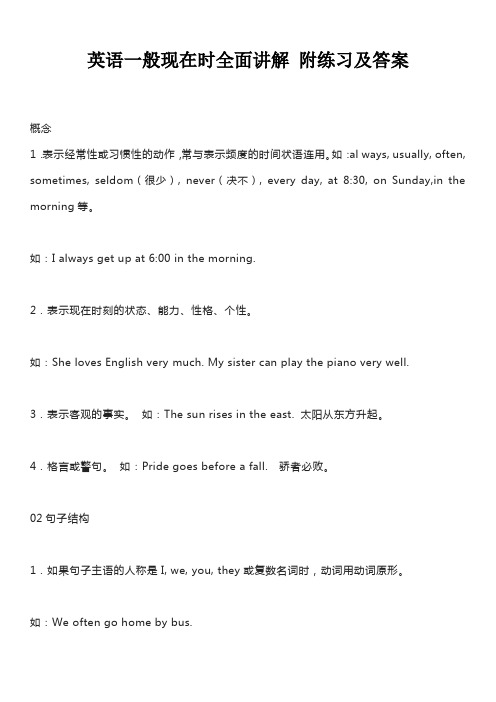
英语一般现在时全面讲解附练习及答案概念1.表示经常性或习惯性的动作,常与表示频度的时间状语连用。
如:al ways, usually, often, sometimes, seldom(很少), never(决不), every day, at 8:30, on Sunday,in the morning等。
如:I always get up at 6:00 in the morning.2.表示现在时刻的状态、能力、性格、个性。
如:She loves English very much. My sister can play the piano very well.3.表示客观的事实。
如:The sun rises in the east. 太阳从东方升起。
4.格言或警句。
如:Pride goes before a fall. 骄者必败。
02句子结构1.如果句子主语的人称是I, we, you, they或复数名词时,动词用动词原形。
如:We often go home by bus.2.如果句子的主语是第三人称单数,即:he, she, it 或单数名词时,动词要用第三人称的单数形式。
如:He often goes home by bus03动词的第三人称单数构成规则1.一般情况下在动词的后面直接加“s”;如:work→works play→plays¬ rain→rains see→sees visit→visits2.以o, x,s,sh, ch结尾的动词,在后面加“es”;如:do→does fix→fixes guess→guesses wash→washes teach→teaches3.以辅音字母加y结尾的动词,先把“y”改为“i”, 再加“es”;如:fly→flies study→studies carry→carries4.不规则变化。
如:have→has04注意在一般现在时的句子中,如果前面使用了助动词does, doesn’t, will, won’t, can, can’t, would, wouldn’t, must, mustn’t 等,尽管主语是第三人称单数,后面的动词用动词原形。
(完整版)一般现在时的讲解及练习题
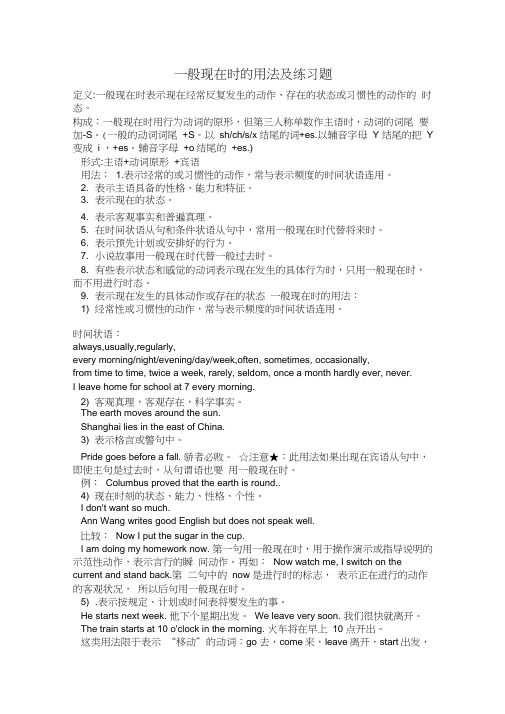
一般现在时的用法及练习题定义:一般现在时表示现在经常反复发生的动作、存在的状态或习惯性的动作的时态。
构成:一般现在时用行为动词的原形,但第三人称单数作主语时,动词的词尾要加-S。
(一般的动词词尾+S。
以sh/ch/s/x结尾的词+es.以辅音字母Y 结尾的把Y 变成i ,+es。
辅音字母+o结尾的+es.)形式:主语+动词原形+宾语用法: 1.表示经常的或习惯性的动作,常与表示频度的时间状语连用。
2. 表示主语具备的性格、能力和特征。
3. 表示现在的状态。
4. 表示客观事实和普遍真理。
5. 在时间状语从句和条件状语从句中,常用一般现在时代替将来时。
6. 表示预先计划或安排好的行为。
7. 小说故事用一般现在时代替一般过去时。
8. 有些表示状态和感觉的动词表示现在发生的具体行为时,只用一般现在时,而不用进行时态。
9. 表示现在发生的具体动作或存在的状态一般现在时的用法:1) 经常性或习惯性的动作,常与表示频度的时间状语连用。
时间状语:always,usually,regularly,every morning/night/evening/day/week,often, sometimes, occasionally,from time to time, twice a week, rarely, seldom, once a month hardly ever, never.I leave home for school at 7 every morning.2) 客观真理,客观存在,科学事实。
The earth moves around the sun.Shanghai lies in the east of China.3) 表示格言或警句中。
Pride goes before a fall. 骄者必败。
☆注意★:此用法如果出现在宾语从句中,即使主句是过去时,从句谓语也要用一般现在时。
例:Columbus proved that the earth is round..4) 现在时刻的状态、能力、性格、个性。
- 1、下载文档前请自行甄别文档内容的完整性,平台不提供额外的编辑、内容补充、找答案等附加服务。
- 2、"仅部分预览"的文档,不可在线预览部分如存在完整性等问题,可反馈申请退款(可完整预览的文档不适用该条件!)。
- 3、如文档侵犯您的权益,请联系客服反馈,我们会尽快为您处理(人工客服工作时间:9:00-18:30)。
一般现在时的基本用法及练习一般现在时的用法一般现在时表示人、事、物现在的状况和特点或表示经常性、习惯性的动作,句中常有always、often、usually等时间状语。
现在时还可用于表达格言、科学事实、客观真理和至今不变的客观事实。
注意:主语是任何一个单数名词或者是第三人称单数,谓语动词要进行必要的变化。
特别提一点:不可数名词也算作单数处理。
动词第三人称单数的变化规则及发音规律动词原形变第三人称单数的规则与发音规律同名词单数变复数大致相同,请认真观察。
1、大多数动词在词尾加“S”,在清辅音后发音为[s],在浊辅音及元音后发音为[z]。
如:stop-stops [s] make-makes [s] read-reads [z] play-plays [z]2、以辅音字母加“y”结尾的,要先将“y”变为“i”,然后在加“es”读[iz]如:fly-flies [z]; carry-carries [z] study-studies [z]; worry-worries3、以“s, x, ch, sh”结尾的,在词尾加“e s”,发音为[iz]如: teach-teaches [iz]; watch-watches [iz]4、以“o”结尾的动词,加“es”,读[z]如:go-goes [z] do-does [z]句型I.疑问1.对于谓语动词或助动词是 be、have、can/may/must 等,将这些词移到主语前面。
Are you students?Yes, we are. / No, we aren't.你们是一名学生吗?是的。
我们是一名学生。
/不,我们不是。
Is Jane in the classroom? Yes, she is. / No, she isn't.简在这个教室里面吗?是的,她在。
/不,她不在。
Does the house have two rooms? Yes, it does / No, it doesn't.这栋房子里面有两个房间吗?是的/不,不是。
Is there any water in the glass? Yes, there is. / No, there isn't.杯子里面有水吗?是的,有。
/不,没有。
Can you swim? Yes, I can. / No, I can't.你会游泳吗?是的,我会。
/不,我不会。
2.谓语动词是实义动词,方法是在主语前加助动词do或does构成,句中动词要改用原型动词。
do用于第一人称和名词复数,does用于第三人称单数和名词单数或不可数名词。
Do you know it?Yes, I do. / No, I don't.你知道这个吗?是的,我知道/不,我不知道。
Does she have a pen?Yes, she does. / No, she doesn't.[have 这里是实义动词]她有一个钢笔吗?Do they play basketball after school? Yes, they do. / No, they don't.他们放学后打篮球吗?II. 否定1. 对于谓语动词或助动词是 be、have、can/may/must 等,后面直接加not。
I am not at college.我不在上大学。
Mr. Wang isn't 50 years old.王先生不是50岁。
The Jacksons have not two sons.贾克森没有两个儿子。
You may not go now.你现在不可能去了。
2.谓语动词是实义动词,是在谓语动词前加do not 或does not,谓语动词改用动词原型。
I don't have lunch at home.我在家没有吃午餐。
They don't play basketball on the sportsground.他们不在运动场上打篮球。
Mr.Jimmy doesn't know French.吉米先生不会法语。
一般现在时用来表示经常的或习惯性的动作,常与以下的时间状语连用:often 经常,always 总是,sometimes 有时,usually 通常,every day/ week 每天/ 周等。
He/She usually goes to school by bike. 通常他/她骑车上学。
I visit my grandparents every week. 我每个星期都去看祖父母。
He/She is always late for class. 他/她总是上课迟到。
My parents and I sometimes go out to eat. 我和父母有时出去吃饭。
It often rains here. 这儿常常下雨。
一般现在时用法专练(A)Ⅰ.用括号内动词的适当形式填空。
1. He often (have) dinner at home.2. Daniel and Tommy (be) members of the Reading Club.3. She and I (take)a walk together every evening.4. There (be) some water in the bottle.5. We (not watch) TV on weekdays.6. Nick (not do) his homework on Sundays.7. they (like) the World Cup?8. What they usually (do) on holidays?9. your parents (read) newspapers every day?10. The girl (teach) us English on Sundays.Ⅱ.按照要求改写句子。
1. Daniel watches TV every evening. (改为否定句)Daniel TV every evening.2. I do my homework every day. (改为一般疑问句并作否定回答)—— you homework every day?——No, I .3. She likes milk.(改为一般疑问句并作肯定回答)—— she milk?—— Yes, she .4. Simon is from Beijing. (同义句改写)Simon Beijing.5. Millie is clever at math. (同义句改写)Millie math.Ⅲ.改错。
1. Is you brother speak English?A B C ( )2. Does he looks like his father?A B C ( )3. He likes play games after class.A B C ( )4. Mr. Wu teachs us English.A B C ( )5….She doesn’t her homework on Sundays.A B C ( )Ⅳ.将下列句子译成英文。
1._桑迪放学后打羽毛球吗?不.她学习很用功.放学后她总是看书.._ Sandy badminton after school?No. She hard. She always books after school.2.他在第三中学上学.他每天早上七点上学.He in No .3 Middle School. He to school at 7a.m.every day .3.父亲早晨送我到学校.My father me to school in the morning.4. 我女儿喜欢看电视和听音乐..My daughter TV and to music.5. 西蒙朋友的姐姐长大后想当一位歌手.Simon’s friend’s sister to a singer when she up.(B)1. 按要求改写下列句子.1、Sandy has long hair in a ponytail. (改为一般疑问句并作肯定回答)Sandy long hair in a ponytail?Yes, .2、Simon and Daniel are good friends .(改为否定句)Simon and Daniel ______ good friends.3、We are in the school football team. (改为一般疑问句并作肯定回答)you in the school football team? Yes, ..4、Amy likes playing computer games. (改为一般疑问句并作否定回答)________ Amy ________ playing computer games? No, ________ ________.5、We go to school every morning . (改为否定句)We ________ ________ to school every morning.6、She is always ready to help others. (改为一般疑问句并作否定回答)________ she always ready to help others? No, ________ ________.7、 The earth goes around the sun. (改为一般疑问句并作肯定回答)________ the earth ________ around the sun? Yes, ________ ________. 8、He speaks English very well. (改为否定句)He ________ speak English well.9、John comes from Canada.(对划线部分提问)Where ________John ________ from?10、I like taking my dog for a walk after supper.What ________ you ________ ________ after supper?.二. 改错1. Lily and Lucy doesn’t want to clean the blackboard.2. Mr. Green likes work in China very much.3. My mother often go to the shop on Sundays.4. She doesn’t likes bread or cakes.5. Where is Jim and Kate now?6. There are some water and leaves in the pool.7. Please give a color pencil for me.8. They aren’t go to school at the weekend.9. The dog sits between the chair.10. She often works hard and goes to bed in night.11. Millie is good in English. She speaks English well.12. She is a member at the Computer Club.13. Do you help your mother in the housework?14. Do Simon often go home by a bus? .15. I often take bus to school.16. Do you want to play with us after the school?17. Daniel and David want to play on us.18. There is a lots of water in the bottle.19. Wendy has much friends in class.20. There are so lots of people in the hall.(C)一用所给动词正确形式填空1. He loves ______________ (read) newspaper.2. Nick goes ______________ (swim) every Saturday afternoon.3. Simon enjoys______________ (play) football.4. Mr. Mu likes ______________ (walk) after school.5. Amy likes ______________ (talk) on the phone with her friends.6. Simon usually goes ______________ (run) for half an hour.7. Sandy enjoys ______________ (look) for things on the Internet.8. I do n’t like ______________ (dance).9. Eric is a member of the ______________ (read) Club.10. It’s a fine day. What about ______________ (play) badminton in the park?二用适当的介词填空1. I go to school _________ my friends.2. Daniel is clever _______English.3. Millie takes Eddie _________a walk every afternoon..4. Kitty lives _________a flat _________Beijing.5. Sandy sits _________Kitty and Amy.6. Here is a picture _________my family. Do you want to look _________it?7. Does Simon often eat _________a restaurant?8. _________ the weekend, Wendy and Kitty play tennis _________an hour.9. Sandy has black hair _________ a ponytail. Kitty has long black hair _________ bunches.10. Mr. Smith comes _________ New York. He is American.(D)1. We often___________(play) on the playground.2. He _________ (get) up at six o’clock.3. __________you _________ (brush) your teeth every morning.4. What (do) he usually (do) after school?5. Danny (study) English, Chinese, Math, Science and Art at school.6. Mike sometimes __________ (go) to the park with his sister.7. At eight at night, she ________ (watch) TV with his parents.8. ________ Mike________ (read) English every day?9. How many lessons ______your classmate____ (have) on Monday?10. What time ____his mother_________ (do) the housework?改句子1. Do you often play football after school? (肯定回答)2. I have many books. (改为否定句)3. Gao Shan’s siste r likes playing table tennis (改为否定句)4. She lives in a small town near New York. (改为一般疑问句)5. I watch TV every day. (改为一般疑问句)6. David has a goal. (改为一般疑问句)7. We have four lessons.(否定句)8. Nancy doesn’t run fast (肯定句)9. My dog runs fast.否定句:一般疑问句:10. Mike has two letters for him.一般疑问句:否定句:11. I usually play football on Friday afternoon.否定句:一般疑问句:划线提问12. Su Yang usually washes some clothes on Saturday.否定句:一般疑问句:划线提问:13. Mingming usually waters the flowers every day否定句:一般疑问句:划线提问14. Tom does his homework at home.否定句:一般疑问句:划线提问(E)I.写出下列动词的第三人称单数形式:1. wash _________ match _______guess______ study______ finish_________ go________ snow______ carry_________2. stop ______ see________ drive ________let_______ carry______ keep_____ join______ find_______ think________ teach______ catch______3. stay _______ begin______ forget_______ forget ______ lie________ die _______ run_______ prefer______ give________ ring_______ dance______ hope_______II. 用所给动词的适当形式填空:1.I ________(write) to you as soon as I _______(get) to London.2. He doesn’t feel well and ____________ (not eat) any food this morning.3. He ______ not _______ (see) me come in, for he ___________ (read) something with great interest.4. I _________ (let) you have the book as soon as I _________(finish) it.5. While we waiting (wait) for our teacher, a little boy ________(run) up to us.6. Don’t make a noise. Grandpa __________(sleep).。
